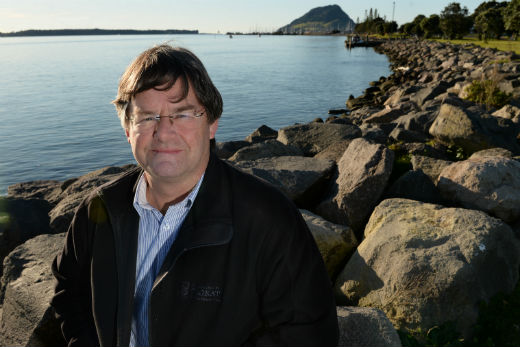Communicating the complexities surrounding the Rena's grounding and subsequent oil spill in 2011 has landed Chris Battershill and David Schiel the ‘Science Communicator of the Year' award.
Recognised by the New Zealand Association of Scientists, the award was jointly presented to the professors at the Royal Society for their collaborative efforts.
Science Communicator of the Year, Professor Chris Battershill. Photo: Supplied.
Chris is Chair of Coastal Science and Head of the Coastal Marine Group at the University of Waikato, while Professor David Schiel is a Canterbury University marine scientist
From the outset, both Chris and David became the public faces of the Rena oil spill, reporting on the effectiveness of the clean-up from an environmental perspective as well as the longer term consequences.
Over a 30-month period, the pair gave over 100 talks at numerous marae, public meetings and conferences alongside dozens of media interviews.
'The grounding of the Rena on Astrolabe Reef led to a remarkable chain of events that continues to have an impact on the national psyche,” says Chris.
'The outrage expressed locally and nationally was considerable.
'It quickly became apparent the public wanted to know what was being done to minimise environmental impacts and what the likely consequences of the oil spill and the debris contamination would be.
'In the early days, many of the meetings were quite heated as people vented their outrage about the oil spill.
'Over time, the public became increasingly well-informed and grew interested in following the science behind the impact and the environmental recovery phases of the incident.
'It was also important to the citizens involved in the clean-up operation that they knew their efforts were worthwhile and would lead to quick recovery of the marine environment.”
Chris and David devoted the years following the Rena incident to communication and follow-up about the science related to environmental recovery from the spill.
In doing so, they greatly served iwi and the general public in the Bay of Plenty, as well as satisfying a national craving for impartial and high-quality information about the spill's effects.
Both professors agree that the public and the media have benefited from having top-quality scientists front recent disasters in New Zealand.
'This has helped to thoroughly explain events in understandable terms to every audience and help allay fears about potential consequences from that disaster,” says Chris.
The University of Waikato's Coastal Marine Field Station in Tauranga, which Chris heads up, has experienced unprecedented growth in research demand since opening in 2011.



3 comments
What?
Posted on 23-11-2015 14:56 | By Kenworthlogger
Quote ... "The greatly served iwi and the general public" Is that not all and the same thing???
Not the same!
Posted on 23-11-2015 15:47 | By Mackka
No 'Kenworth logger' - unfortunately they have not been 'all and the same thing for many years'. The "greatly served iwi" says it all. The general public have not been as greatly served as have the iwi !!!
1
Posted on 23-11-2015 20:55 | By Capt_Kaveman
it took 5 days for govt or local body's to respond, locals had by this time already removed large clumps of tar like paddys and left them at the beach access awaiting for removal, these locals were locals from all nations, but only one type of people called iwi were the only ones that got compo others + myself lost the use of our beach and we got nothing
Leave a Comment
You must be logged in to make a comment.